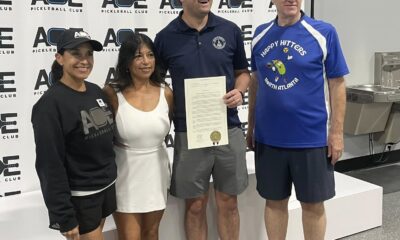City Government
Prime Lunchtime with Brian Johnson, City Manager
Published
6 years agoon
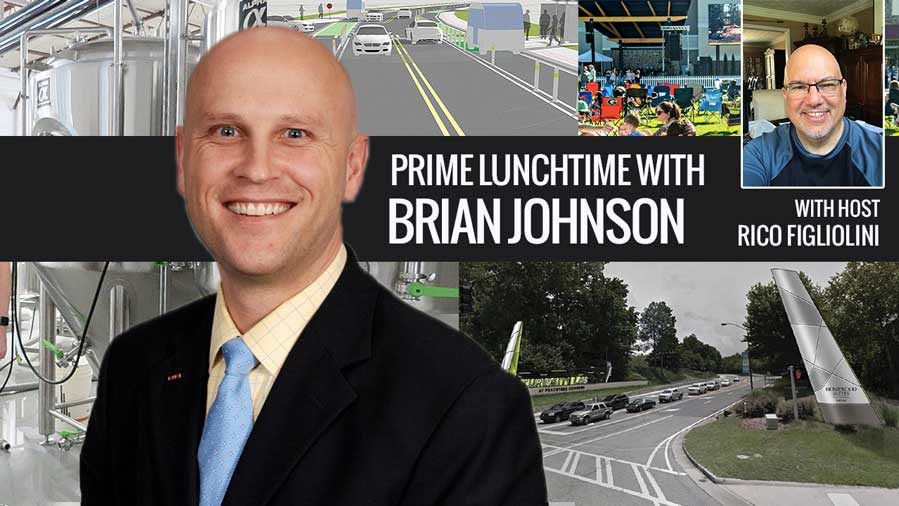
In this episode of Prime Lunchtime, Rico and City Manager, Brian Johnson, discuss the upcoming Smart City Expo and the role that Peachtree Corners will contribute. Brian gives some sneak peeks into the incredible technology that will be demonstrated and accessible during the event, and its implications for the future of smart cities all over the world. Additionally, they discuss developments around the city such as the finishing of the roundabout, new apartment developments at the river corridor, Willie Degel’s new Uncle Jack’s Meathouse, and more.
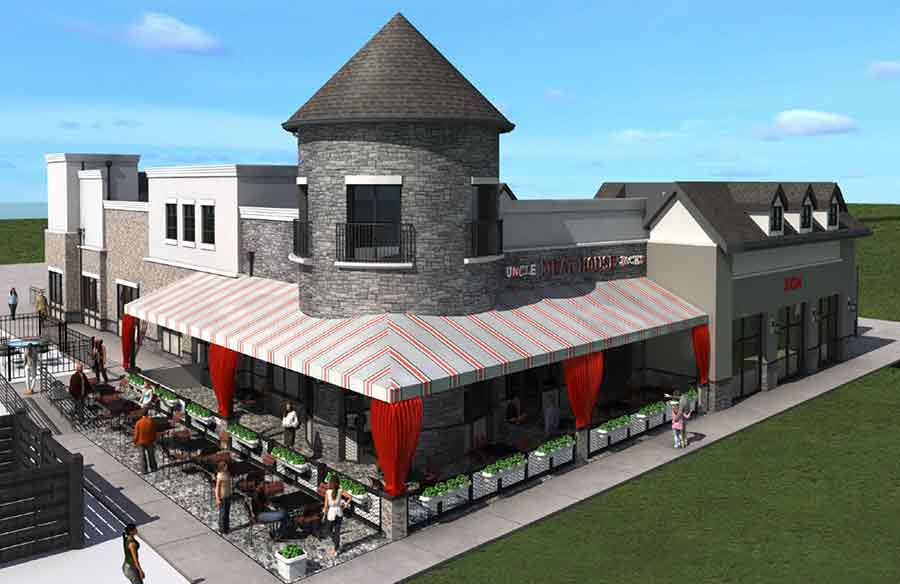
Resources
Smart City Expo Atlanta: https://smartcityexpoatlanta.com/
Podcast Transcript
Rico [01:02 ]: Hey guys, this is Rico Figliolini, host of Peachtree Corners Life, and this is podcast with Brian Johnson is Prime Lunchtime with City Manager.
Brian [01:11 ]: How are you?
Rico [01:12 ]: Good. Just came off another podcast this morning – a videochat with Aarti Tandon, the CEO of the Smart City Expo, which was eye-opening, the stuff that’s going on with the exhibit. 250 speakers, tracks they have, the stuff that we’re doing that’s part of that all. I just want to, before we get there – we are at the Atlanta Tech Park podcast studios, and they’re a sponsor of our show. I want to say thank you to them. It’s a great podcast studio here in Technology Park in the city of Peachtree Corners. And also to say thank you to GMC Primary Care, Gwinnett Medical. They are a sponsor of the family podcasts that I do, including Capitalist Sage with Karl Barham, and I appreciate you guys and thank you for being part of this. So let’s get into what’s going on cause the road’s being built. The pavement’s down. Time is running towards the September 11th date, so tell us what’s going on, Brian, with this whole autonomous vehicle Curiosity Lab at Peachtree Corners.
Brian [02:21 ]: Well, if you’ve been in Tech Park the last couple days, couple weeks, you would notice that, yeah, there’s something going on. So two weeks from yesterday will be our grand opening and ribbon cutting of Curiosity Lab. The, I guess, most visually appealing and easy aspect of Curiosity would be the autonomous vehicle test track, which is being put in on the – on a 1.5 mile section of Technology Park. And right now, as we were driving over here, they’re starting to stripe the lanes, putting all the flexible bollards to separate the, you know, autonomous vehicle, the test and demo lanes from the two inside lanes for the motor and public to use, because, you know, we still have 7500 jobs that are just in Tech Park and about 1000 people are residing here inside of Tech Park. So, we’ve got a lot of people who use it, which is what makes it unique, and yes we are almost at the point where we can cut the ribbon, say, ‘Alright, it’s time to fire this thing up’.
Rico [03:35 ]: Is the control room part of that, too?
Brian [03:37 ]: It is. So, we’ve got this 1.5 mile liner laboratory. Living linear laboratory. And of course, again, you know, you’ve got this test track in the roadway, but also, you’ve got a lot – all the technology infrastructure that is necessary to do any testing with it, mobility for the Smart City space. By that, I mean, it’s not gonna be just about autonomous vehicles – there’s going to be a lot of other testing, things like, in the mobility space for instance, things like connected vehicles. Testing the vehicles’ ability to communicate with, say, light poles, traffic signals, other vehicles, cyclists, pedestrians, a lot of testing in there. There’s testing and everything from infotainment systems to Smart City testing of, you know, digital message boards, street lights to reflectors in the road that change color if there’s hazards up ahead. There’s cybersecurity testing that you can do here because we’re creating the right of way of the future. You know, a street that everything in the street can communicate with each other. The cars can talk to each other, to the pedestrian, the cyclists, the light poles and when you do that, you create all those breach points for somebody to use, to hack, and so there’s some interest some companies are coming in here to test on ways to either protect agains that breach or try to find weaknesses in the system. So, I mean, you know, the sky’s the limit, but it’s not just about mobility. It’s about the whole thing.
Rico [05:23 ]: That’s interesting. Apple this way – Apple is a closed circuit, right? Because this way, there’s only one breach you can have through this system.
Brian [05:29 ]: And actually, to that point, when you talked about the network operations here, all that technology that we’re putting in is on one fiber network. A closed system. Hargray fiber is providing the backbone to this. All this technology including the, you know, the macro and the mini macro, 5G antennas that are part of this. And that’s put in are through fiber networks that’s closed, so it’s not part of the city’s greater fiber system so we can kind of control it in a real world. You know, I was just talking about cybersecurity in a testing component, but we’re gonna have real world data being created, and we don’t want things like, you know, industrial espionage where some auto company steals data from another one. Or we don’t want data to be corrupted, we don’t want people to be able to, you know, begin to hack into the traffic signal that we’re putting in and change the light when it’s not supposed to be. I mean, so, we have a higher degree of controllability and in an inherently uncontrollable environment.
Rico [06:41 ]: Yeah. Do you, do you get any demand or require from developers that come in the same type of – type of security? Because I mean, apps work within that could be a breach point also right?
Brian [06:55 ]: They can. So most of what we’re doing right now is – they’re bringing their devices, but they’re still having to use our software in our system to do it. And so that allows us to be able to make statements about the data created from this, such that we can say we will be in a position where we can respect or honor a company’s proprietary concerns if they come in and they say, ‘Hey for this particular test, we don’t want it to be public.’ We’re – and be in a position where we control that, say ‘Sure’. Conversely, we’ll be in a position where we’re sharing this data and letting others have it. Because it’s creating – there’s no better data to get compiled – the data that’s created in the real world because, inherently, as humans, we do all sorts of things that are unique, and so the data collected in a controlled environment is only so useful. And again, that’s one of the many reasons why this is, you know, a unique asset because we’re not a closed course, we’re a living laboratory. So we took a public street that we’re keeping public, and we’re also allowing testing within that in a safe, you know, manageable manner.
Rico [08:16 ]: Are you going to – so September 11th is the day – is the first day of the Smart City Expo Atlanta. And we have the – and probably the only – offsite demo that’s being done. So they’re gonna bus in attendees that are going to be coming to that. Are you – what demonstrative aspects will we have?
Brian [08:39 ]: So, we’re kind of combining two things. You know, it is the grand opening and ribbon cutting. So at the beginning of it, we’re gonna have a short, little, kind of grand opening. You know, run of show. You are talking about, we’re going to have the Lieutenant Governor speak, we’re gonna have – and the mayor. And we’re gonna have the President of Sprint speak, and the executive vice president for Georgia Power. Those are the two companies, corporate entities, that are gonna have a short role in that because, as companies, they’ve invested in Curiosity Lab, and it’s going to be – it is their laboratory also. So they’re partners with us, but partners in the sense of – they’re gonna be using the lab on an ongoing basis, because it’s kind of like, to a degree, their lab also. Georgia Power’s doing Smart City testing and demo, and of course Sprint’s doing 5G utilization and testing. So, when we get done with that, we’re gonna have a ribbon-cutting. The ribbon is going to be flown up the track by drones. And so the drones will come up to the dignitaries that are gonna be standing there to cut the ribbon, and they will hover while the ribbon is cut.
Rico [09:57 ]: Oh that’s cool.
Brian [10:00 ]: So then, we’re gonna transition from there into – into a couple of active demos. And by that, I mean, they’re demos that can be done in front of the crowd. In front of the tents and the chairs that are set up underneath it. And there’ll be three types. One will be a fully autonomous show. And it’s built by local motors – it’s called Ollie. So it is a driverless shuttle, and we’re gonna get a couple of, you know, the dignitaries to get on the shuttle with the CEO of Local Motors. It’s gonna go around the parking lot in front of City Hall, the parking lot in between the track and in front of City Hall. And so, you’ll be able to see how that technology works, because again, there’s nobody – there’s no steering wheel in it, there’s nobody driving it – it’s fully autonomous. So we’ll have a demonstration of that. We’ll then do a demonstration of an autonomous drone delivering a package. And so we’ll have a drone bring in a package, and it’ll demonstrate how it’ll get to a delivery box. And hover and drop down and drop that box – drop the package into the delivery box. And then we’re gonna have a demo there, and the last demo with everyone sitting there will be a tele-operated e-scooter. By tele-operated means – we al lknow the e-scooter. This company makes essentially training wheels to go on an e-scooter and a camera on the front, and the e-scooter can be activated and driven by a human in a remote location. And you know, we’ve talked about this before – we’ve had tele-operated 18-wheeler, but they can do this with an e-scooter such that they can reposition e-scooters, which is one of the problems that are out there right now, is people leave them wherever.
Rico [11:59 ]: Yeah. Well they’re banning them, as far as making any more.
Brian [12:02 ]: That’s right. There’s no additional – yep. And so they’re controversial because often times it’s the typical, this is why we can’t have nice things because a few people ruin it for everybody else. And so people are kind of being careless with driving them and also leaving them and, you know.
Rico [12:21 ]: So we might see –
Brian [12:23 ]: You’re gonna see a scooter driving down the sidewalk with nobody on it. And so those are the three – those are some of the tech that you’re gonna actually – the attendees are actually gonna be able to see in front of them. Not on a video, not reading about it – we’re actually going to see it. And then we have a bunch of other stuff. So at that point, we’ll basically tell everybody that the formal part is done, and then we’ve got a bunch of other demos. We’ve got a number of cars – KIA is bringing up their concept car – the Habanero. It’s a – it’s an advanced car that’s not in production yet. They’re gonna bring up the Telluride and Stinger also, which are pretty advanced but they are commercially available. We’ve got everything from soft bank robotics, and Sprint has some robots that are gonna be brought out. Then we’ve got autonomous lawn mowers – somebody called Green Seeds is going to bring out those. So then you can go to the different booths and you can – you know, they’ve got another robot that has a follower behavior. In other words, it can link it to a person to follow, and it’ll follow that person even through a crowd, where it knows how to avoid people but still keep its eye on the person. They use micropositioning. So it positions itself down to the, you know, centimeter, millimeter, so you can really navigate complicated environments because its GPS location is so accurate.
Rico [14:13 ]: So that’s almost like it will be an assistant. Almost like Alexa following you.
Brian [14:17 ]: That’s right. But even in complicated environments. SO those are the demos that are being set up which you can walk up to it and they’ll show you.
Rico [14:25 ]: Wow. A lot of interesting –
Brian [14:27 ]: And we’ve got a lot of interesting stuff that’s not quite the edge of technology, but there’s a company called Wreath that’s coming and showing off their mobile kitchen. In which their concept is to take a shipping container and put a kitchen in it, and put it at a location, and it’s not for use by anybody to walk up and order. It’s all for the food delivery like Uber Eats. And these kitchens can cook, you know. I think I’ve seen as many as five different menus from known restaurants. And you can, like, order from a Chili’s menu or an Applebee’s menu or an iHop menu – whatever, and it can do all of those. But then it’s delivered through one of the delivery. So, you know, that’s not necessarily what you necessarily think about just cutting mobility, but it’s unique and so we’re gonna have a lot of stuff from people. Let’s see – a lot of people are interested. We’ve – we at least have seven members of the consulate corps of Atlanta. You know, countries that have consulates in the metro-land area. The consul generals from those consulates are gonna be coming up because they’re interested in the space. Or there’s companies from these countries that are interested.
Rico [15:54 ]: So you’ll have your own little exhibit going on.
Brian [15:56 ]: Yes. There’ll be kind of an exhibition both inside and outside. Inside City Hall we’ve got some of our multi-use space that will be set up for some of these companies to kind of show off their stuff. And outside there’ll be some stuff, too. And so, yeah. It’s gonna be – and that’s the kickoff, and then everybody who’s part of the conference will go down, and at 1:00 it starts down at the Georgia World Congress Center. And we’ll have space in the exhibition hall, and we’re gonna show off the mini model we had made. It will be for the event. So –
Rico [16:36 ]: And you have a sign that says – the signage at the beginning at 141 and Technology parkway is gonna –
Brian [16:46 ]: Yes. So you know – part of the – now, you know, we’re – I would have loved to have about 45-60 more days to finish everything before the event. We didn’t have a choice. We didn’t pick the dates. You know, of course, I don’t know if necessarily the city of Atlanta or the metro area that was part of bidding to get this conference – I don’t know if they necessarily had any say int he dates. But when it was announced that there was gonna be a Smart City conference here, we knew we had an asset that was unique, and they said yes to our partner. A little earlier than I would like, so there’s gonna be parts of the track that are not complete. Like some of the signage. But we are trying to start with the signage, the gateway signage at Tech Park 141. And then bring it up just past City Hall and make sure that’s all done. Because that’s how most of the people will drive in. And so they’ll be able to see that card, and then we’ll continue with the rest of it.
Rico [17:49 ]: It’s exciting to get that, I’m sure. I know from what Aarti was telling me from the earlier podcast that there’s so much going on at the Expo that I can’t wait to visit that, to see that. It’s a lot. And especially I’m sure even the after-hours and that stuff.
Brian [18:03 ]: Yes. There’s a number of after-hours. Because you’ve got some of these companies that are coming in for this – a lot of them are from countries outside of North America, and the reason they’re interested is because it’s an opportunity. This is the first Smart City Expo in North America.
Rico [18:22 ]: In the US for sure, because I think Mexico –
Brian [18:25 ]: Oh did? Okay, so it’s the US. And so, it’s, you know, it’s a unique opportunity for companies who are not based here to have a presence here to show off what they’re doing to get into this market. And so there’s a lot of after hour stuff of companies having some people come in and do some special things.
Rico [18:42 ]: That’ll be interesting. There’s also a lot of CIOs – Chief Information Officers –
Brian [18:47 ]: And CTOs.
Rico [18:49 ]: Yeah, CTOs from all the cities coming in, so that’ll be fun. I mean, people who couldn’t get to Barcelona coming to Atlanta instead because it’s within their budget.
Brian [19:00 ]: Because, yeah. I’m speaking at the conference on Friday, so you know, there’s a lot of interesting panel discussions. Classes on all sorts of stuff. So yeah, on one with the city manager of Carlsbad, California. Doing some interesting things with 5G.
Rico [19:19 ]: So you get to talk to him too, maybe.
Brian [19:23 ]: I mean, yeah. We’re always interested in – delegation from the city of San Diego came yesterday to see what we were doing cause they’re doing some stuff. But, you know, we’re always learning from each other. But I think it’s fair to say that what we’re creating here, if you consider all the unique aspects has not been created anywhere in the world. Because, first, we’re a living lab, so we’re not competing with the closed laboratories or courses. But we have 5G now. This building has 5G right now. So, and the others will catch up soon, but we have it right now. We’re not charging for the use of the facility. So it’s not a pay to play. We are not requiring intellectual property rights of any sort on anything that’s been created out of testing here. We’re respecting times where somebody has proprietary information and they want upwards – in some cases if you do it on public anything, it’s all public regardless. And then, the last two things that make us really unique beyond what I just said is – there’s only one governmental entity that you have to deal with. A lot of – you’ve got county, state, feds, you know – even the – Georgia has a rural interstate version that’s called the Reg. You know, 18 mile section of I-85 from the Alabama state line to West Point, Georgia. But everything they do, they have to get permission from Georgia GOT and the federal highway. because it’s not their roadway. So we are the single entity, so we can move quick. We can say yes. You know, we can cut up the road and put in, you know, testing panels if we want them. We can do whatever we want because it’s our road. and then the last thing, which I think is also really makes us unique is – cities throughout the country have to insure their roadway. You know, general liability insurance for roadway. Because stuff happens – sometimes, a city’s gotta defend itself. In some cases, the city has some culpability. It could be that something happened to the road. There’s a sinkhole and the car goes in, and we let it. So whatever, we’ve got to have liability coverage. What you don’t see is, when you have a public street, I can’t limit access to it. I have an insurer, no insurance company will insure that public street when you include testing of advanced technologies. As soon as you try to do that, they’re like, ‘woah, woah, woah, no no no. We’re not going to want that.’ We got our insurance. We have insurance, and we got it through *insurance company*. That’ll, you know, are known for being in a position to insure basically anybody. And when they tell us, aside from us having never heard of any city doing this, when we were talking to the carriers about what they’re all like, ‘no, no, no.’ And a lot of reason is – because of the drive – when there was a cybersecurity component to it. They don’t like to have to insure any data created from use of this public. And so that was one. But the main one was, the advanced vehicle testing. Especially when you got it to the drivers. Because, about 98.7% of automobile accidents are driver error. There’s some driver or there’s some component – statistically, so actuaries can handle that because they have, you know, a century of historical data to run basics on. When you remove a component that is 99% at fault from the equation, they get real uncomfortable. Like, ‘Okay, wait a second. How do we even forecast what our exposure here is? Because who’s going to be to blame?’
Rico [24:00 ]: Because they don’t have history.
Brian [24:03 ]: Correct! Is it going to be the OM that made the vehicle. Is it going to be the software in the vehicle? Is it going to be the components that comprise it? Is it gonna be the wireless signal that they’re using to run – I mean who’s to blame? And so Lloyd stepped up and said, based on, you know, the environment we’ve created, the, you know, some of the safety measures we took to make, you know, our living lab to be – to have a higher degree of controllability that you normally see with this kind of testing. They said yes – we will insure it. So we are – again, I can’t. I’m not sure anybody else has coverage over a public street that includes that. So any of the insurance carriers that we talked to in the US – we’re US based – would say, ‘We’ll insure the city. We’re gonna carve that 1.5 miles out.” But we found one that did –
Rico [25:03 ]: It’s – that’s interesting. I mean, you – the city’s in a position to be able to actually create legislation that can take care of that to a degree. Within city limits. To say, you can have autonomous vehicles. These are the parameters. Of course, those laws could be tested at some point, right?
Brian [25:24 ]: Oh, they always are.
Rico [25:27 ]: But this is a great opportunity for a city that’s doing this in a living environment to also begin investigating, ‘How can we legislate this in our city?’
Brian [25:38 ]: Well, so there’s a component of all of this. These companies are interested in being a part of something that’s going to create the new normal in that area. In the insurance industry, there’s a degree of that we got. The company’s like, ‘Look, we’ll do this. Here’s our -‘ But we’re also interested in watching how this plays out. Because, you know, I think they’re seeing the long term play. Which is – look, every city’s gonna have this at some point. There’s gonna be driverless and human-driven on the public road at the same time at some point. So you gotta get in at some point. Like, look – the city, which has created this really easy environment for us to get invovled in, has done this really unique thing. Why not now? Let’s go ahead and get in on this. So there’s a degree of that. You know, the other thing too is, the state of Georgia – whether many of those involved knew it or not, created a very friendly environment for the testing autonomous vehicles. Because there – most states require there to be a human in the vehicle even if it’s driverless. But Georgia is one that does not. Now, it does require, if it’s driverless, if something goes wrong, it’s got the operator of the vehicle has got to be able to take control of the vehicle. That could either be a tele-operated human, or like a kill switch. Where it can just shut it down and stop it, and you can go out to the thing and take it over. A lot of states do not.
Rico [27:16 ]: Right, and that legislation just passed.
Brian [27:19 ]: It was, just a couple of years ago. So we’re a very friendly state when it comes to the testing in this. So, the city, being in the Georgia municipality, has benefitted from that foresight. So there were some people who thought of that a couple years ago. Maybe there were some legislators who didn’t realize what they were doing, but we put ourselves to a point where I think we can really attract companies that are in this space because the state’s kind of friendly to it. We’ve got a city that’s friendly to it. A city that’s controlling the entire right of way to this. It’s easy – there’s not a lot of bureaucratic hurdles. So, given the amount of partners we have, the amount of interest, I don’t really have to say this. It’s selling itself.
Rico [28:03 ]: Oh, for sure. I gotta believe. And things with this expo and the exposure there, we could probably have the news show up. Are you excited by any particular exhibit or company showing there that you’ve heard of that you got to see? That you got to visit for the expo?
Brian [28:24 ]: Well, you know, no. Only because all of the ones that I was excited are actually coming up to our place. So there’s some that we’ve got some meetings, and afterwards we’re gonna talk. I’m sure there’s some that I don’t know of yet, but all the ones that we were interested – you know, we’re not necessarily shy when it comes to companies doing something where – if they don’t know about us, let’s send them some stuff. Usually that’s enough for them to say, ‘Um yeah, we would like to come out and look or talk and so’. Most of those that are coming in and inviting up – yeah.
Rico [29:02 ]: I can’t wait. September 11th, 12th and 13th. And the morning of the 11th we’ll be here. That’s great. So that’s happening. It’s gonna be for the next two years, so we may go back.
Brian [29:15 ]: For the Smart City Expo.
Rico [29:17 ]: So that’s the biggest thing to talk about.
Brian [29:24 ]: Well right now, like you said, the city is still running.
Rico [29:27 ]: There’s several things to talk about also – other things that are happening. The – I guess, let’s go down the list a little bit. This way people can be informed a little bit. The roundabout is going to be finished at some point.
Brian [29:41 ]: In the next 72 hours, maybe? I mean, for the traffic stuff that – it’s all the paving stuff.
Rico [29:50 ]: So it’s raised a little bit? Because that center part looked a little hard to me.
Brian [29:54 ]: Well, inside of the median still have work. We’ve gotta fill some of them in, we’ve gotta do some stuff. But I’m talking about, when it comes to the traffic. Cause you know, inside of the curbs that are poured, that’ll not affect traffic. but the striping, the paving’s done, the curbs are all in, the striping’s gonna be happening, maybe happening right now. Sometimes, you know, the weather – I don’t know if they’re doing that at night either. But anyway, so it’ll only be inside filling in those things, you know, go from there. Kind of the last accouturements at the end to make it pretty. And the lines.
Rico [30:37 ]: And the lines – people are a little confused, do they have to get on the lane – there’s actually two lanes.
Brian [30:45 ]: Well, yes. Because if you need to go more than halfway around, you would stay on the inner lane until you get to – but yeah, the striping will handle that. That’ll make it so it’s not so confusing.
Rico [30:58 ]: That’s what I was thinking. But some people just can’t get it straight. City council handled a few things. Let’s just go into that a little bit. I know, well, at least to let people know. I know Tipsy Nail Salon finally got their alcoholic beverage license approved, I think?
Brian [31:13 ]: They did. Now theirs is for the, um, what is it called?
Rico [31:19 ]: The retail packaging.
Brian [31:22 ]: Yeah. So that one – yeah, retail package in one license. So that’s the one where you can – under that permit is where you can have wine tasting or – it limits the amount you can drink in a time period. Because it’s kind of like for, you know, like a wine store has. You can taste wine. It’s a limit so you can’t go in there and taste so long.
Rico [31:50 ]: But they can have sort of a happy hour, when you go and get your nails done.
Brian [31:54 ]: Yes. So while you’re there – but again, state law sets how much alcohol you can have in periods of time. And they apply to that yes, they can qualify for that.
Rico [32:05 ]: Okay, so, and then, I believe the mechanics bill – the town has developed on that – there was a second read of consideration on that?
Brian [32:13 ]: But the applicant pulled. The applicant pulled because there were some environmental, I guess challenges that required them to adjust the site plan. Actually, they’re making the project a little bit smaller because it was – it was cost-prohibitive for them to get into certain wetlands over there. So I think they’re pulling it back, so – because of that, they gotta go back to planning commission to start it all over.
Rico [32:46 ]: So it sounds like the wetlands – they don’t want to clean it out.
Brian [32:51 ]: No, it wasn’t about that – I’ve not heard anything about pollution. But wetlands are expensive in two regards, if it’s an actual wetland. First of all, you’ve gotta get permission. There’s a lot of regulatory stuff to fill in a wetland. Sometimes you’ve gotta buy wetland credit sell square, you know, things like that. So environmentally it’s difficult because, technically, the aggregate amount of wetlands in Georgia has to stay the same. So if you fill in wetlands here, somewhere else you’ve gotta create them.
Rico [33:23 ]: It’s an impervious surface also.
Brian [33:27 ]: Yeah, well that is – even though it’s kind of a separate issue, even though they’re both storm water related. So wetlands can be a lot of cost on the bureaucracy. And two, you also have to – if you’re filling in wetlands, you’ve gotta bring in stuff and sometimes you’ve gotta dry pilings in the ground because the soil has not been compacted long enough. And so often times it just gets cost-prohibitive for somebody.
Rico [33:53 ]: SO they’re gonna take their time and come back.
Brian [33:55 ]: Well yeah, my understanding is they’re already on the planning commission agenda, but because they’re redoing their site plan, there’s a material change, they’ve gotta start the process over. So they pulled their application to start over.
Rico [34:10 ]: Okay, cool. The – going down the list of the city council, the definitions of nuisance of urban camping. So, two parts to that, right? One is redefining certain definitions, I guess. Was the second reading consideration in the ordinances. And also there was a second part that was a mandate about specific sections of articles 1-4, really about conflicting ordinances, I guess. How to deal with unsafe buildings, drugs, sexual abuse in buildings and stuff like that.
Brian [34:41 ]: So, the urban camping definition – well so, we went into our code section and had to update a lot of stuff. And so, when attorneys went through and did this, they identified some things that were in conflict with stuff, state law had changed in certain things that were now in conflict. We needed to bring it up, there have been court cases that kind of – so it’s bringing a lot of stuff up to code. The main things, after that -we had to change some terms, make things accurate as far as state law goes. Then, we had some things that had not been addressed that we needed to. Like, we needed ot have a prohibition against standing water in certain things. Some people were having pools and stuff that they weren’t keeping clean, it was breeding mosquitoes. So there are some things like that. And then urban camping is one which we only have to address as we started to own public property – town green. And so those are – that was what drove these. It’s just pretty typical for cities to go through code every now and then and kind of say, ‘Alright, we’re gonna clean it up some of this stuff.’
Rico [35:58 ]: From experience also, you realize you may need changes because of the way life goes, right? Then, there was also the town center. Okay, so I did an interview with Willie Degel from Uncle Jack’s Steakhouse, Meathouse. It’s actually Steakhouse in New York, Meat house here. So they requested some changes to their elevation plans. The building’s actually gonna be a little bigger, I guess? There was the original plan for the Xfinity –
Brian [36:29 ]: Well, I don’t think the inside of the building’s gonna be bigger. I think there’s just gonna be more outdoor seating so that Willie can actually have more people. Which is really what required him to change some of the – so, you know, Fuqua Development which is our private partner with the Town Center development – they owned a building Willie’s going to lease. So they’re the ones that actually have to petition the city because they’re the owner of the building. And they’ve had to work through with him to get the facade to look the way that he wants his branded Uncle Jack’s Meathouse. and that required them to come back.
Rico [37:12 ]: He was telling me a little bit about the New York – they actually have a Bootleg entranceway downstairs, you know, that he brought through the bathroom to get to the safe. They open the slot, they let you in – a speakeasy. It’s interesting, only in New York type of deal, experience. And that’s what he’s looking for, experience.
Brian [37:34 ]: Well, you know, there’s one here near the energy center, an Uncle Jack’s Meathouse, right. And I’ve been to it. They do a good job in creating an ambience that’s unique. And so yes. We’re looking forward to it. It’s going to be – it was an experience beyond just the food. She did a good job up there, it’s a little bit – that one was a renovation of an existing one, so, we’re looking forward to it.
Rico [38:07 ]: Yeah, so am I. This is a show, and the food supports our state. He likes –
Brian [38:12 ]: He likes both. And some of the really good chefs, if you want to go to a restaurant – they are good. They realize that it’s a combination of two things that make you – make those places places people wanna go. They have good food. And then also, if you have bad ambience or non descript ambience, you don’t set yourself apart, then people won’t necessarily go either. So he does a good job –
Rico [38:43 ]: I can’t wait to see it. That’ll be spring of 2020. It’s a bit away. Um, Earth Fair. The old Earth Fair, if anyone knows where that is still. There’s new people running it now, but it’s where the shopping center – Marcos – they had an auction there. They’re auctioning off the inside of that store. Organic farmers auction. It wasn’t clear what they were auctioning. It was really the supermarket. Do you know what’s going on there? I hear there’s maybe someone coming in there, but –
Brian [39:18 ]: Well, so what I can say is, it does look appear that the owner of the entire shopping center, you know, the entire development has potentially come to terms with Earth Fair, which was the leasee. And of course they closed it before the lease ran out. So there was some negotiation between the two so that the space would become available again. So there is indications that they’ve worked that out. And Earth Fair is wanting to extricate all of, you know, their old equipment and whatever because, you know, they know that something’s coming in. We do not have anything official as far as who the next one is other than just the owners and, you know, asking a few questions and we’re gonna have something soon.
Rico [40:16 ]: It sounds like also, they’re losing the dry cleaner there too. Again, I’m getting some information from next door which isn’t always the best way – that’s right.
Brian [40:26 ]: It’s potentially, sometimes when this happens, when you would, I guess call the anchor tenant, is changing, you’d have a lot of the ancillary, smaller places that feed off of the big one. You know, good examples of that would be – you can go out, you see a lot of Publix, or if I remember, Kroger or Walgreens had a good relationship with Krogers. So Krogers would build, a Walgreens would go next to it. People were always like, ‘Why?’ Because they felt like they fed off each other well. THere’s examples of that. SO when the anchor tenants change, oftentimes those ancillary ones, you know, change also. Because they may not feed off of the anchor – the next one versus the one they had next door. And so, it wouldn’t surprise me if that s happening because they’re gonna need a C state change there. It’s gonna be kind of a rollover of that space.
Rico [41:33 ]: But it would make sense that, I don’t see another place coming in. And it is the entertainment district over some expensive…Anything special going on in any other parts of the city that we should be aware of?
Brian [41:48 ]: Um, now back to school, that dust is settling. We’ve got the pedestrian bridge will start soon. They’re doing geotechnical soil stuff. We have had some movement on both by certain property developers and by certain property – developers of the property behind Black Walnut and Chase. I think Hotel Indigo and – so both of them have progressed in their behind the scenes stuff on getting through getting certain things from the city. Visor got their market certificate approved by us, ARC recommended us approving it – our council approving it, so. That’s to be developing property within the river corridor – the old Visor property – a lot of it is in the river corridor. So, you know, they’re moving forward. So those two people – it takes, even after they get a rezoning from the city, only after that can they move forward with getting financing and maybe even getting partners who will maybe build things.
Rico [43:12 ]: So the department and the town and the hotel is moving along.
Brian [43:16 ]: Boutique hotel. Yes, there’s movement there, too. Starting to need some information from us, asking about certain things, so those are good signs. Guinnett Medical Center opened there.
Rico [43:30 ]: Yup, shared city primary care. Just next door –
Brian [43:32 ]: The old Apolitos.
Rico [43:35 ]: Yup, completely cleaned it out.
Brian [43:37 ]: So, some of that. We had the qualifying came equipped. So we had four seats that were up for reelection. So it was Lorri Christopher, Phil Sadd, Alex Wright, and Mayor Mason. Three of the four are running unopposed. The only one that has a challenger is Lorri Christopher.
Rico [44:04 ]: She post or at large?
Brian [44:06 ]: She’s at large. And so, we will have an election, but it will only be one of the seats. So that’s significant.
Rico [44:16 ]: Yeah, that is. It shows that a lot of people are happy with them.
Brian [44:20 ]: That’s usually a fair assessment when you’re unopposed. Generally people are like, ‘You know what? They’re doing a good job. We do not need to run against them.’ Not to say that people just pick one, you know, it’s not because – here, you basically could have picked any of them.
Rico [44:35 ]: I guess, yeah. That’s true.
Brian [44:44 ]: Yeah, but I’m saying, you didn’t get that where you live or anything, you know, so it’s just something like a dart board and you don’t know what it lands on. Lorri Christopher –
Rico [44:53 ]: It’s a lot of work to do this, and people don’t understand that. Work sessions, council meetings, and all the stuff beyond that. But people don’t understand the amount of time it takes, it’s commitment to do the job well. To can do the job and not do it well.
Brian [45:11 ]: That’s correct. You could almost be absentee – show up twice a month, but no. There is a lot of stuff. People don’t realize that expectations of – you need to be certain places, representing city places, meeting with people, because you need to learn something or meeting with people because they asked for a meeting with you, even if it’s not. I would say at least half of the services requested from the city are referred to me by council members who, when they met or talked on the phone, told the person, “Well I don’t have the authority. You’ve got to talk to the city manager.” That’s where the – it’s a referral from a council member because – well, people don’t really know, they’re like – there’s this bush that’s growing out into the road and it’s making the sight line hard to see. I want the city to trim it back. And they think, how do I get it done? Call my elected local official. There’s nothing wrong with it all, I’m just saying that it takes their time. Because oftentimes, I need to meet with you to talk about it. They don’t know. So then they meet, they get it done, at the end of it, they’re like, well you know what? That sounds reasonable. However, I need you to talk to the guy that can actually get it done. And so, yeah. It’s a lot of their time. Part of being –
Rico [46:40 ]: Part of being a city rep. We’ve been spending our time here with Brian Johnson, city manager, talking about Smart City Expo that’s coming up September 11, 12 and 13th. Three day expo in the city’s World Congress Center. So feel free to find out more about that at SmartCityExpoAtlanta.com. And if you need your bushes trimmed or something –
Brian [47:05 ]: Come directly to City Hall.
Rico [47:09 ]: You don’t have to go to your city council person. But so much stuff going on. Hopefully, we’ll find out more stuff about the apartment complex and Indigo and Visor property and Earth Fair in the coming months, but I appreciate the time because this is always enlightening. It’s always a good place to hear things online and the forms and stuff like that – it’s always good to know the straight stuff.
Brian [47:37 ]: Well, I can speak on behalf of all the city when the part of our job is to communicate with our residents, and we can try as hard as we want, but we can never get to everybody. So you can never have too many communication mediums, and this one is a great one, so we appreciate you doing it because even if we reach a couple people who don’t, you know, go on our website, aren’t getting our newsletters or whatever, but they heard this, that’s an important part of it. So we appreciate you doing this. It’s a way of educating our citizenry.
Rico [48:12 ]: Well, this is Peachtree Corners Life, we appreciate you being here. Find out more about our post and our other podcasts at LivinginPeachtreeCorners.com. And look for the Peachtree Corners Magazine in October in the first week. It should be in your mailbox. All 18,800 mailboxes. Thanks guys.
Related
City Government
Peachtree Corners Hosts Discussion About the Future of Local Policing
Published
7 days agoon
May 12, 2025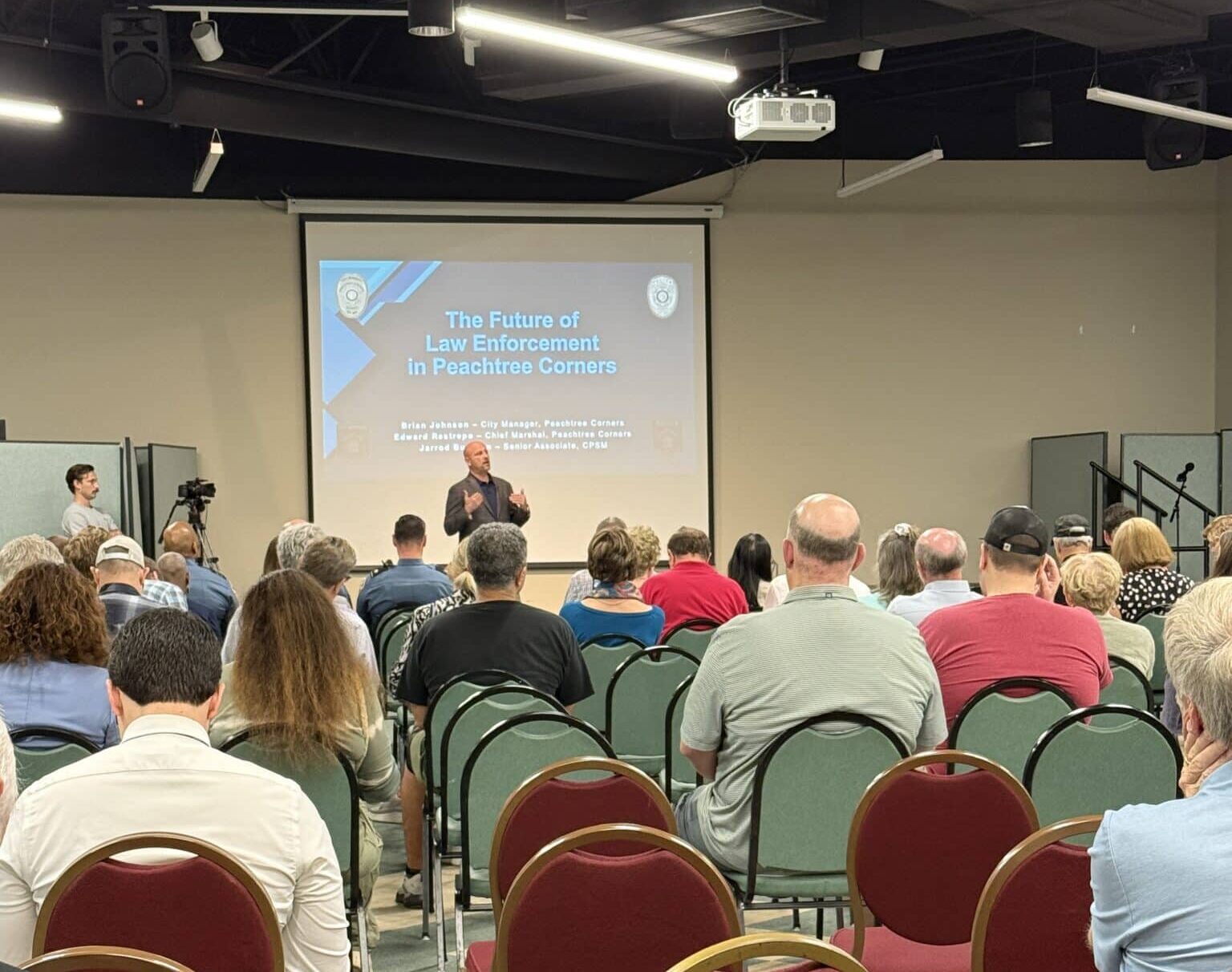
Although crime isn’t on the rise, and the Gwinnett County Police Department (GCPD) is fulfilling its role in fighting crime, the City of Peachtree Corners is asking residents, business owners and city stakeholders if they believe the city should form its own police department.
With over 100 people in attendance, City Manager Brian Johnson led the discussion about the future of policing in Peachtree Corners. He presented the findings from a survey conducted by the Center for Public Safety Management (CPSM), a nationally-recognized law enforcement consulting and training firm, as well as information about patrol officer staffing, response times, costs to tax payers and a potential timeline.
Ensuring public safety
Johnson kicked off his presentation by explaining that it is the duty of the mayor and city council to ensure public safety, including reviewing law enforcement.
“Maybe it needs to grow, maybe it needs to change its focus. But city council is the one that has the decision-making responsibility,” he said.
He was also adamant that this isn’t a done deal.

“I hit this point already, but I want to hit it again. This is the start of a conversation, a community conversation and feedback to council. There hasn’t been a decision,” he said. “Council has not received this presentation from me. They’re here to watch and learn from your feedback of this.”
Mayor Mike Mason was present at the meeting, along with all of the city council members except Eric Christ who was out of town and watching remotely.
Issues and obstacles
Johnson explained that the grounds for the inquiry were based on issues about communication, access to information and enforcement of city-specific ordinances. He cited an example where a city rule that private residences can’t be rented on a short-term basis like Vrbo or Airbnb wasn’t enforced by GCPD. An owner tried to circumvent the ordinance by only renting the outside of the house. A loud pool party ensued, and frustrated neighbors dialed 911.
“Officers showed up and they said, ‘We can’t enforce the city’s noise ordinance,’” Johnson said.
The first stage to fix this problem was creating the marshal program to bridge the gap between code enforcement and GCPD.
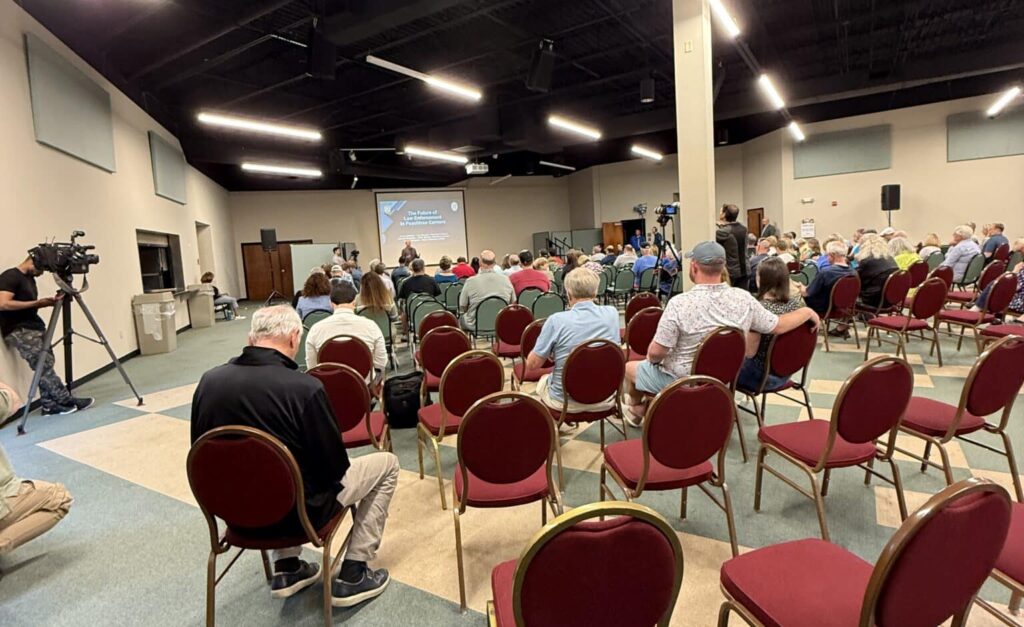
“[We thought] they would be able to enforce both local ordinance and state law, since they are a function of the city, and they could maybe be a force multiplier for Gwinnett since [marshals] don’t have to respond to 911 calls,” said Johnson.
But other issues arose shortly after the department was formed.
“We were still working towards getting that good balance, but we have been faced recently with a couple of things that make it harder for us,” said Johnson.
Seeking shared access
Instead of GCPD giving PTC marshals read-only, quick access to incident reports, dispatch calls and other information, the marshals department was required to file open records requests through the same process as any civilian.
“They were denied, as well as the city of Sugar Hill, [when] asked for the ability to see, not change, but see the computer-aided dispatch information, so that they would know where Gwinnett County police officers were; so that they could avoid stepping on their toes or maybe looking to support their efforts, and they haven’t been granted that,” said Johnson.
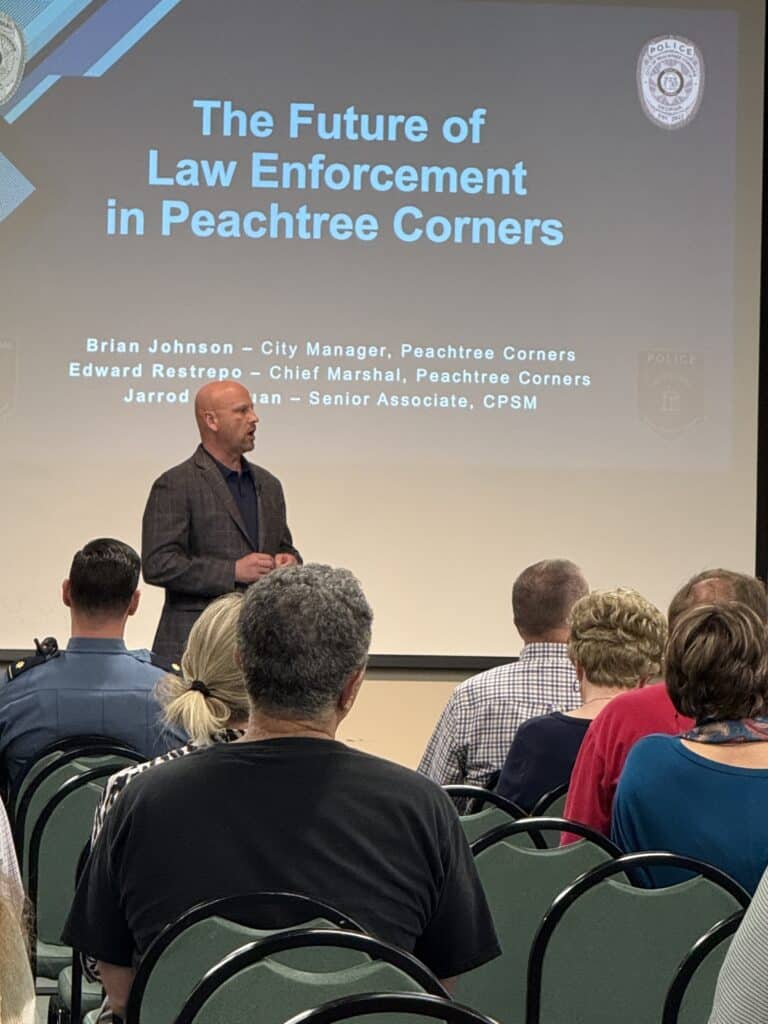
He added that the GCPD has video cameras on certain roadways that are used for various reasons, and law enforcement can use them when there’s crime in the area. Peachtree Corners marshals were denied access to those cameras.
“Conversely, we have a couple hundred cameras in the city, and we definitely want them to have access to them,” said Johnson. “So the frustration out of not being able to get that symbiosis between the marshals and police made us start thinking, all right, you know, is there another option?”
Community feedback
CPSM utilized data from GCPD to discern if Peachtree Corners could feasibly stand its own force. It also took into consideration crime trends, costs and many other factors. It recommended a 55-officer department, costing $12.1 million annually, with a $2.2 million upfront cost.
Comparing the two options to “renting vs. owning” the primary law enforcement agency in the city, Johnson presented pros and cons for each. Once the question-and-answer portion began, there was no obvious choice. Men and women, young and more advanced in age, had both similar and differing opinions.
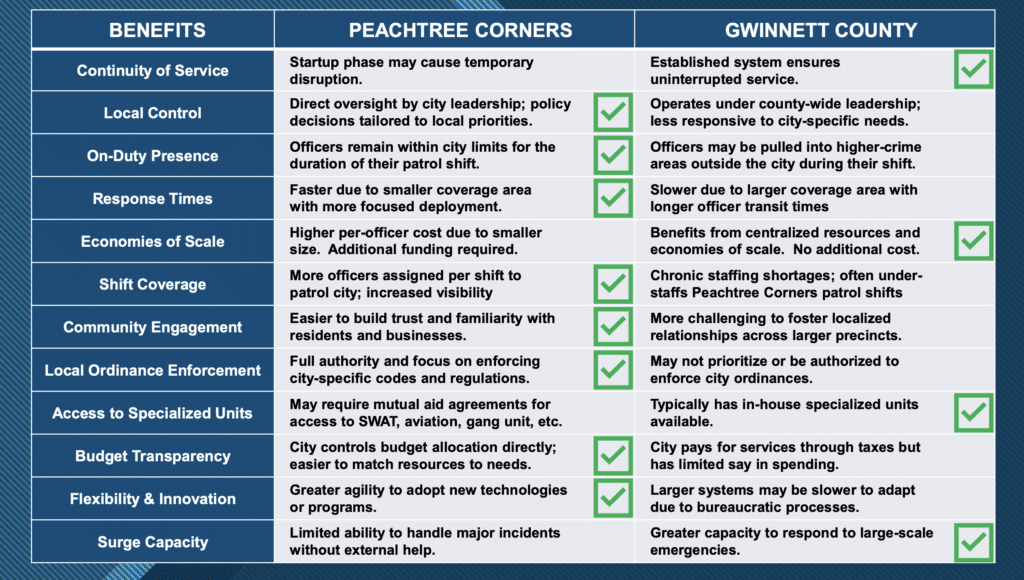
One young man, who identified himself as a local small business owner named Alexander, argued that with artificial intelligence increasing the efficiency of administrative tasks, perhaps the city wouldn’t need a full 68-man department of civilians and sworn officers.
Some accused the city of devising a solution in need of a problem. Others were concerned that paying approximately $100,00 for a study was throwing good money after bad.
But at the end of it all, the city is continuing to seek feedback and is encouraging everyone to make informed decisions. The meeting was taped and is available on the city website along with Johnson’s PowerPoint presentation, a copy of the study done by CPSM and a survey.
As far as a timeline goes, city officials would like folks to take the summer to mull it over and come back in the fall to take another look at the proposal.
Related
City Government
City of Peachtree Corners Awarded Certificate of Achievement From GFOA for Seventh Straight Year
Published
1 week agoon
May 9, 2025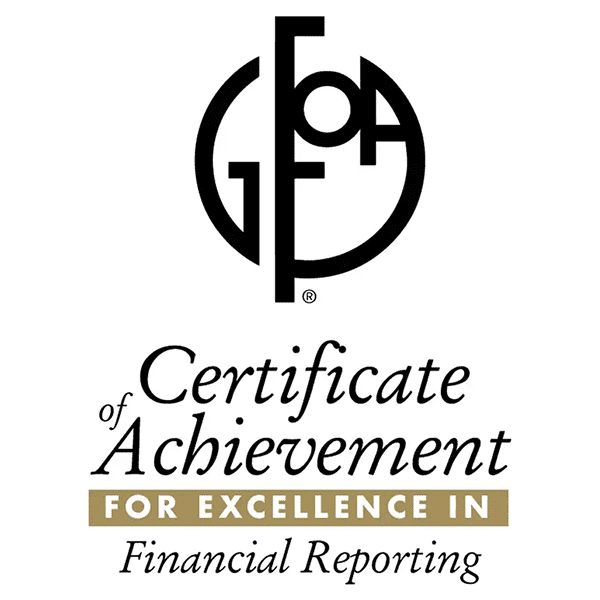
The City of Peachtree Corners’ finance department has been awarded a Certificate of Achievement for Excellence in Financial Reporting from the Government Finance Officers Association of the United States and Canada (GFOA) for its 2024 financial year-end comprehensive annual financial report (CAFR).
The GFOA’s Certificate of Achievement is the highest form of recognition in governmental accounting and financial reporting, and its attainment represents a significant accomplishment by a government and its management.
It is the city’s seventh year of receiving the award and represents a significant accomplishment by the city’s finance department and its leadership.
According to a GFOA release, “The report has been judged by an impartial panel to meet the high standards of the program, which includes demonstrating a constructive ‘spirit of full disclosure’ to clearly communicate its financial story and motivate potential users and user groups to read the report.”
“We are pleased to again receive this honor,” said City Manager Brian Johnson. “Our finance department, and Finance Director Cory Salley, are to be commended for this achievement, as it is the highest form of recognition GOFA presents.”
A comprehensive annual report
The city’s finance department produces the CAFR each year and works with independent auditors to verify the city’s financial situation and standing.
“This prestigious award affirms Peachtree Corners’ dedication to exceeding basic requirements by producing comprehensive annual financial reports that reflect a strong commitment to transparency and full disclosure,” said Assistant City Manager Brandon Branham.
About the GFOA
The Government Finance Officers Association (GFOA), founded in 1906, represents public finance officials throughout the United States and Canada.
The association’s more than 20,000 members are federal, state/provincial and local finance officials deeply involved in planning, financing and implementing thousands of governmental operations in each of their jurisdictions. GFOA’s mission is to advance excellence in public finance.
To learn more about the GFOA, visit gfoa.org.
For more about the City of Peachtree Corners, visit peachtreecornersga.gov.
Related
City Government
The Future of Law Enforcement in Peachtree Corners: Community Meeting
Published
1 month agoon
April 14, 2025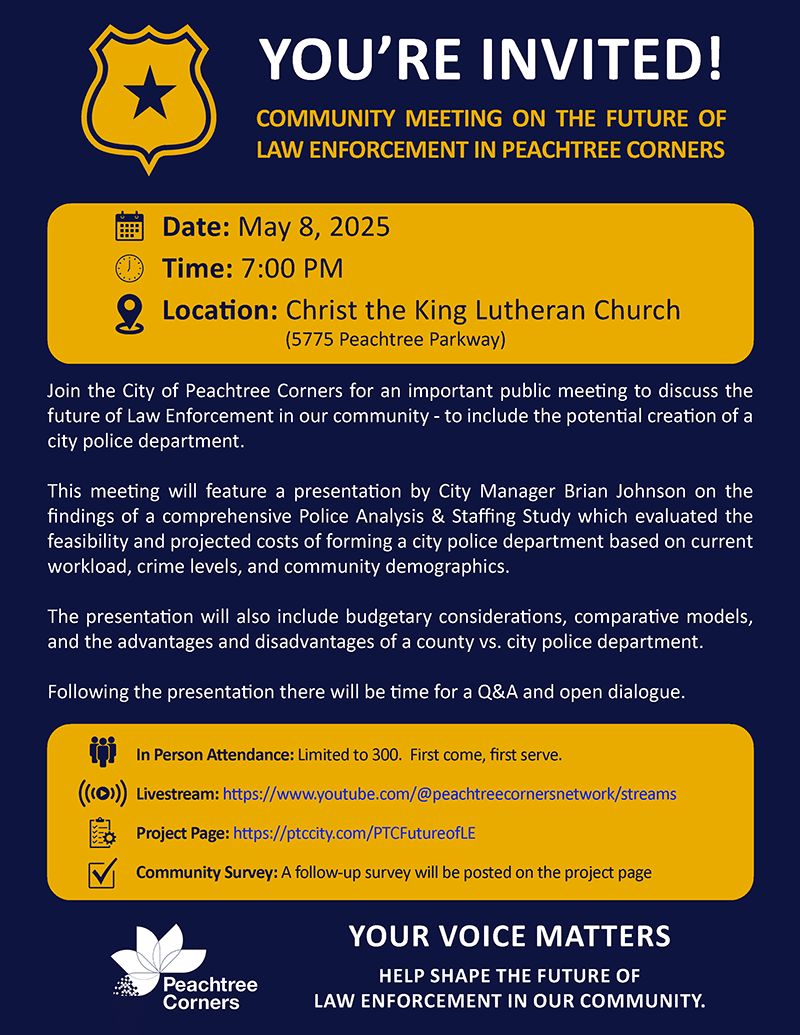
The City of Peachtree Corners will hold an important public meeting on May 8 to discuss the future of law enforcement in our community — including the potential creation of a city police department.
This meeting will feature a presentation by City Manager Brian Johnson on the findings of a comprehensive Police Analysis & Staffing Study that evaluated the feasibility and projected costs of forming a city police department based on current workload, crime levels and community demographics.
The presentation will also include budgetary considerations, comparative models and the advantages and disadvantages of a county vs. city police department.
Following the presentation, there will be time for a Q&A and open dialogue.
In-person attendance is limited to 300. First come, first served. A livestream option will be available for those who can’t attend in person.
After the meeting, a follow-up survey will be available on the city’s project page.
Meeting details
The Future of Law Enforcement in Peachtree Corners
Date/Time: May 8, 2025 at 7 p.m.
Location: Christ the King Lutheran Church (5775 Peachtree Parkway)
For more information, visit peachtreecornersga.gov.
Related
Read the Digital Edition
Subscribe
Keep Up With Peachtree Corners News
Join our mailing list to receive the latest news and updates from our team.
You have Successfully Subscribed!

Official City Merchandise Line Debuts This Saturday at Town Green

Peachtree Corners Hosts Discussion About the Future of Local Policing

Executive Function: A Tribute to Working Moms

Peachtree Corners Grows Business Opportunities Through Economic Development

D1 Training Brings New Fitness Concept to Peachtree Corners

Simpson Elementary Marks Exceptional Children’s Week

City of Peachtree Corners Awarded Certificate of Achievement From GFOA for Seventh Straight Year

Atlanta’s Dog Howl-O-Ween Festival Moving to Peachtree Corners for 2025

MomoCon 2025 to bring 60,000 Fans to Atlanta for a Weekend of Cosplay, Animation, Gaming and Music

Local Special Olympics Pickleball Team Honored with State House Resolution

Atlanta’s Dog Howl-O-Ween Festival Moving to Peachtree Corners for 2025

D1 Training Brings New Fitness Concept to Peachtree Corners

Peachtree Corners Hosts Discussion About the Future of Local Policing

City of Peachtree Corners Awarded Certificate of Achievement From GFOA for Seventh Straight Year

Simpson Elementary Marks Exceptional Children’s Week

Executive Function: A Tribute to Working Moms

Light up the Corners [Video]

Capitalist Sage: Business Leadership in Your Community [Podcast]

Cliff Bramble: A Culinary Adventure through Italy

Top 10 Brunch Places in Gwinnett County

A Hunger for Hospitality

THE CORNERS EPISODE 3 – BLAXICAN PART 1

Top 10 Indoor Things To Do This Winter

The ED Hour: What it takes to Remove Barriers from Education

Peachtree Corners Life
Topics and Categories
Trending
-
Pets & Animals5 days ago
Atlanta’s Dog Howl-O-Ween Festival Moving to Peachtree Corners for 2025
-
Around Atlanta3 days ago
MomoCon 2025 to bring 60,000 Fans to Atlanta for a Weekend of Cosplay, Animation, Gaming and Music
-
Sports4 days ago
Local Special Olympics Pickleball Team Honored with State House Resolution








